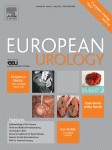Rouprêt M, Zigeuner R, Palou J, Boehle A, Kaasinen E, Sylvester R, Babjuk M, Oosterlinck W. Eur Urol. 2011 Apr;59(4):584–94. Epub 2011 Jan 14. IF: 7.667

Abstract:
CONTEXT: The European Association of Urology (EAU) Guideline Group for urothelial cell carcinoma of the upper urinary tract (UUT-UCC) has prepared new guidelines to aid clinicians in assessing the current evidence-based management of UUT-UCC and to incorporate present recommendations into daily clinical practice. OBJECTIVE: This paper provides a brief overview of the EAU guidelines on UUT-UCC as an aid to clinicians in their daily practice. EVIDENCE ACQUISITION: The recommendations provided in the current guidelines are based on a thorough review of available UUT-UCC guidelines and papers identified using a systematic search of Medline. Data on urothelial malignancies and UUT-UCCs in the literature were searched using Medline with the following keywords: urinary tract cancer, urothelial carcinomas, upperurinary tract, carcinoma, transitional cell, renal pelvis, ureter, bladder cancer, chemotherapy, nephroureterectomy, adjuvant treatment, neoadjuvant treatment, recurrence, risk factors, and survival. A panel of experts weighted the references. EVIDENCE SYNTHESIS: There is a lack of data in the current literature to provide strong recommendations due to the rarity of the disease. A number of recent multicentre studies are now available, whereas earlier publications were based only on limited populations. However, most of these studies have been retrospective analyses. The TNM classification 2009 is recommended. Recommendations are given for diagnosis as well as for radical and conservative treatment; prognostic factors are also discussed. Recommendations are provided for patient follow-up after different therapeutic options. CONCLUSIONS: These guidelines contain information for the diagnosis and treatment of individual patients according to a current standardised approach. When determining the optimal treatment regimen, physicians must take into account each individual patient's specific clinical characteristics with regard to renal function including medical comorbidities; tumour location, grade and stage; and molecular marker status.
-mk-